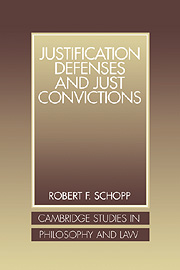Book contents
- Frontmatter
- Contents
- Preface
- Frequently Cited Sources
- Dedication
- 1 Justification Defenses: The Issues
- 2 Justification Defenses and the Conventional Public Morality
- 3 Self-defense
- 4 Self-defense and Battered Women
- 5 Duress and Systemically Complete Mitigation
- 6 The Limits of Justification: Necessity and Nullification
- 7 Conclusions
- Index
3 - Self-defense
Published online by Cambridge University Press: 29 October 2009
- Frontmatter
- Contents
- Preface
- Frequently Cited Sources
- Dedication
- 1 Justification Defenses: The Issues
- 2 Justification Defenses and the Conventional Public Morality
- 3 Self-defense
- 4 Self-defense and Battered Women
- 5 Duress and Systemically Complete Mitigation
- 6 The Limits of Justification: Necessity and Nullification
- 7 Conclusions
- Index
Summary
Mother Beneficence and Dudley raise the specific justification defenses of self-defense and defense of others, respectively. These defendants present intuitively and legally clear cases because they represent a standard form in which a competent and culpable aggressor (A) attacks an innocent victim (V), and V or a third party defends V by exercising necessary and proportionate force against A.
Section 1.2.1 identifies three difficult tasks that a comprehensive theory of self-defense must address. First, a satisfactory account must accommodate cases that elicit ambivalent intuitive responses and raise substantial doubts about justification because they diverge from the standard form. These cases might involve, for example, innocent aggressors (IAs), innocent bystanders (IBs), or innocent shields (ISs). Second, a satisfactory theory must present and defend appropriate parameters for the defense. It must explain, for example, the proper role, if any, for a duty to retreat and for requirements of imminence and proportionality. Third, a satisfactory account must provide a theoretical foundation that explains and justifies the defense in a manner that accommodates the difficult cases and the prescribed parameters.
This chapter pursues two projects. First, it advances a substantive theory of self-defense addressing the important problematic concerns listed above. This account integrates the central features of current legal doctrine with justificatory principles found in liberal political philosophy. Second, this chapter advances a methodological thesis in that it interprets the law of self-defense in light of the broader and more abstract principles of political philosophy represented by the legal rules. On this approach to legal analysis, the structure and content of the law reveal underlying principles of political morality.
- Type
- Chapter
- Information
- Justification Defenses and Just Convictions , pp. 55 - 88Publisher: Cambridge University PressPrint publication year: 1998



